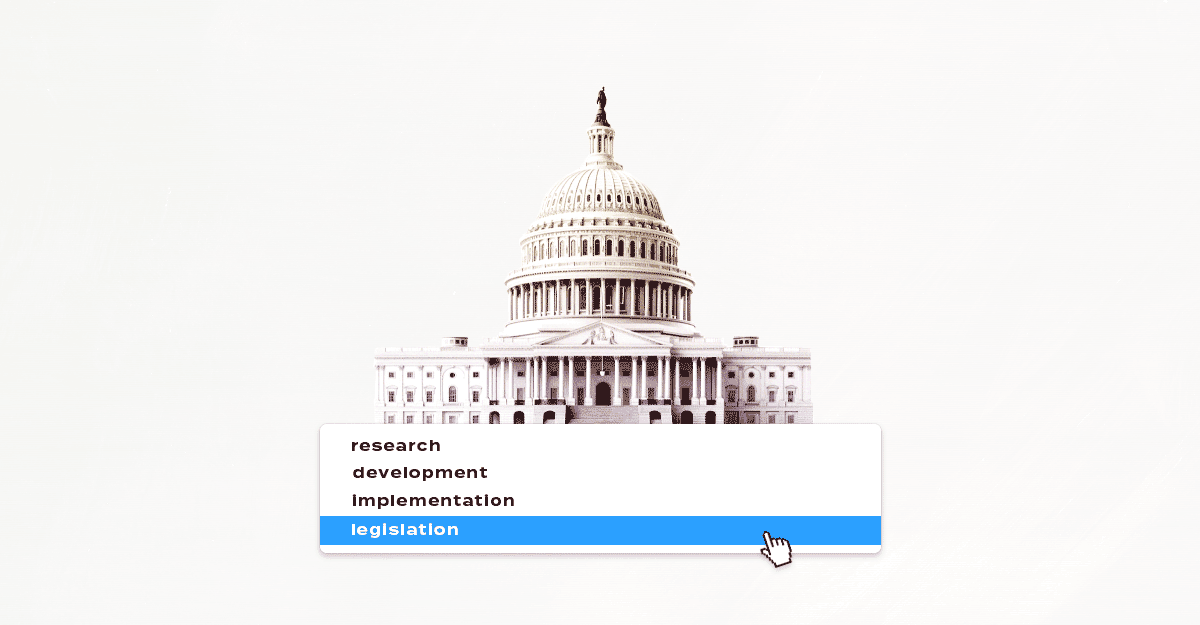
New Legislative Proposals to Deploy Artificial Intelligence Strategically
Since the debut of transformative technologies like ChatGPT in late 2022, AI policy has surged to the forefront of public discourse in Washington, D.C. We’ve witnessed a whirlwind of activity across the executive and legislative branches, from numerous congressional hearings and AI Insight Forums to a series of executive actions and policies implemented by various federal agencies.
With the advent of the bipartisan Roadmap for Artificial Intelligence Policy in the U.S. Senate, the Federation of American Scientists views legislative action as critical for advancing the state of AI Governance. Congress, in its current state of division, has struggled to advance any of the numerous proposed AI frameworks and bills. This legislative gridlock is partly due to the narrow and ideologically opposing majorities in the House and Senate, stalling progress at a time when it is most needed. Yet, the need for comprehensive AI governance is becoming increasingly important and cannot be indefinitely postponed. As AI technologies continue to evolve and permeate various aspects and sectors of society, the urgency for robust legislative frameworks to manage both the risks and opportunities associated with AI intensifies.
The time is ripe for AI-related legislation. To help address the serious policy questions posed by AI, the Federation of American Scientists hosted an AI Legislation Policy Sprint to crowdsource, develop, and publish a set of creative AI-focused ideas that could be taken up by Congress. We are proud to publish a final slate of 15 policy memos from experts in artificial intelligence across critical sectors such as healthcare, education, and research and development, addressing themes such as privacy, AI safety, workforce development, and responsible innovation.
Innovation
Four ideas ask Congress to devote resources and create guidelines to promote equitable research, development and innovation within the U.S. AI space. From the creation of a NIST foundation to support the agency’s important work on AI research and standards development, to AI entrepreneurship visas, shared classified commercial working spaces for Department of Defense contractors, and safe harbor policies for independent researchers, these proposals look at maximizing American entrepreneurship in the AI sphere.
A NIST Foundation To Support The Agency’s AI Mandate >>>
Shared Classified Commercial Coworking Spaces >>>
National Security AI Entrepreneur Visa: Creating A New Pathway For Elite Dual-Use Technology Founders To Build In America >>>
A Safe Harbor For AI Researchers: Promoting Safety And Trustworthiness Through Good-Faith Research >>>
Trust, Safety, & Privacy
These memos look at cutting edge ways that Congress can foster trust in emerging technologies and mitigate risks from advanced AI systems. Ideas include early warning systems for national security and public safety, considerations for child online privacy in the age of generative AI, and creating an AI Incident Reporting System.
Establish An AI Incident Reporting System >>>
An Early Warning System for AI-Powered Threats to National Security and Public Safety >>>
Update COPPA 2.0 To Strengthen Children’s Online Voice Privacy In The AI Era >>>
Education
In schools and classrooms, students and teachers are increasingly interacting with AI models via edtech platforms, chatbots, and more. Cutting edge tools such as automated scoring systems have the potential to reduce teacher workload and administrative burden, thus increasing quality teaching time with students. However, students and teachers often lack the training and guidance needed to positively utilize AI. Six memos describe policy interventions to improve AI in the education sector. Examples include a new NSF program focusing on AI literacy training and professional development for teachers, accelerating research pathways for AI topics at the Institute of Educational Sciences (IES), and ensuring that students with disabilities are protected from harmful misuse of AI tools.
Establish A Teacher AI Literacy Development Program >>>
Address The Disproportionate Impacts Of Student Online Activity Monitoring Software On Students With Disabilities >>>
A National Center For AI In Education >>>
Supporting States In Balanced Approaches To AI In K-12 Education >>>
A National Training Program For AI-Ready Students >>>
GenAI In Education Research Accelerator (GenAiRA) >>>
Healthcare
The use of AI in healthcare has so many possible benefits, from diagnosing cancer to catalyzing research for a cure. However, AI in healthcare also has its risks from privacy and data protection violations to algorithmic discrimination harming patients. Our two policy ideas look at different ways we can mitigate health disparities from the use of AI and set standards for safe data sharing in a research environment.